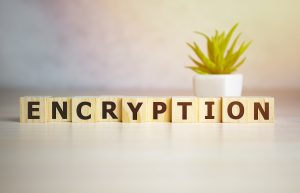
Over the past 12 months we haven’t only experienced a COVID-19 pandemic, there’s also been a “cyber pandemic.” Phishing attacks related to the crisis rose 605% and there have been increases in multiple types of malware and other security incidents.
The increase in cyberattacks has caused many Rhode Island businesses to take a hard look at their data and network security to see where vulnerabilities might be. The last thing a business owner wants on top of all the pandemic disruption is to have an IT security crisis.
The average cost of a data breach for a small business ranges from $120,000 up to $1.24 million.
When companies are looking for ways to protect their sensitive business data from breach and malware, one of the strongest methods they can consider is encryption.
Data encryption uses a mathematical algorithm to “scramble” data so it cannot be read by anyone that doesn’t have the decryption key.
Encryption is typically done in two ways:
- Symmetric encryption: The same key is used to both encrypt and decrypt the data. You can think of it as using the same passcode to both lock and unlock a door.
- Asymmetric encryption: This would be like using a different passcode to lock a door than you use to unlock the door. Asymmetric encryption uses two different keys, once called a “private key” (or “secret key”) and the other a “public key.”
While encryption is a familiar concept to many companies, they’re not always sure how to deploy it in their workflows to help with data protection and strengthen their cybersecurity.
If you’ve been wanting to increase your level of protection so you’re not caught off guard by the rising cyberthreats, here are several helpful ways to use encryption at your business.
Use a Virtual Private Network (VPN)
Data traveling through unsecure Wi-Fi is a major security risk. Hackers can conduct man-in-the-middle attacks, and if that data isn’t encrypted, can steal it.
Today’s workforce is more spread out than ever before, with a significant percentage of the population working from home due to the pandemic. During this time, approximately 20% of organizations have experienced a security incident due to a remote team member.
One of the best ways to secure those connections, whether on home or free public Wi-Fi, is through the use of a business VPN.
VPN’s will reroute a device’s internet connection through their servers and encrypt the data transmission. VPN can be used on both computers and mobile devices of all types through an app.
Email Encryption
People send and receive emails a good portion of the day, but many companies don’t have any specific safeguards in place to protect emails with particularly sensitive information inside or sensitive file attachments.
For example, it’s not usual for a company to email sales figures or even an unsecured spreadsheet containing a company vendor list with all their personally identifiable information (PII).
You can use an email encryption option in a program like Outlook in Microsoft 365 that will encrypt an email, contents and attachments, and only the designated recipient will be able to decrypt it.
A workflow like this can be used along with sensitivity labels, another Microsoft 365 feature, which can automatically encrypt emails with a specific label (such as “confidential”).
Laptop Hard Drive Encryption
Many employees use a laptop, especially if they work from both home and the office. This laptop might have sensitive company data on the hard drive or may have login access to company bank accounts or customer databases through a CRM application.
During the lifetime of a laptop, there is a 1 in 10 chance of it being stolen. So, a thief could gain access to all types of information, including:
- Documents on the hard drive
- Documents in a syncing cloud platform
- Any saved browser passwords
- Applications that stay logged in (such as social media)
- Email and email sending
One way to protect a business laptop completely is to use hard drive encryption. This can be done through a software or hardware device that’s used in the USB port of a laptop.
Once a laptop drive is encrypted, the contents cannot be accessed by anyone except for the user with the passcode or decryption key. This is an important safeguard for any employee devices that are taken from place to place and that have access to particularly sensitive business data.
Website Encryption
When visiting or hosting a non-encrypted website, any data that is shared with that site through a webform or shopping cart is unprotected and can be easily picked up by hackers. This includes credit card details.
A website that is encrypted is designated with “https” at the beginning instead of “http.” It will also be noted by a lock icon to the left of the URL.
A non-secure website is now being noted pretty prominently by browsers as non-secure, which can cause those new to your company to pause and possibly move on.
It’s good to both have your website encrypted by having a security certificate purchased and try to have your team stay on secure websites as possible. You should also definitely not to input any sensitive information into a form on a website that is not secure.
Get Help Implementing Encryption for Data Protection
Onsite Techs of Rhode Island can help your business with encryption solutions that keep your data and network more protected.
Contact us today to schedule a consultation at 401-773-7766 or reach out online.


